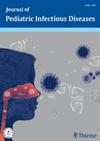Experience with Methicillin-Resistant Staphylococcus aureus in a Central London Tertiary Pediatric Hospital
IF 0.3
4区 医学
Q4 INFECTIOUS DISEASES
引用次数: 0
Abstract
Abstract Objective Methicillin-resistant Staphylococcus aureus (MRSA) infection is very serious, and thus, it is common practice, worldwide, to screen for MRSA colonization at admission and institute decolonization procedures. Our aim was to review adherence to local guidelines and sepsis risk in pediatric patients with a focus on surgical cases. Methods A retrospective case note review was conducted from January 2019 to October 2020 in a tertiary pediatric hospital. Data collected included demographics, incidence of sepsis, pediatric intensive care unit (PICU) admissions, and adherence to guidelines. The results were analyzed with an SPSS statistical package. Results MRSA screening was performed in all 47,904 admissions; 161/47,904 had MRSA colonization. All underwent topical decontamination; however, isolation guidelines were adhered in only 7.45%; 71/161 were surgical patients; 23/71 were admitted to the PICU. Irrespective of the class of wound, 4/71 surgical patients developed MRSA sepsis. Of these, 2/5 surgical patients did not receive MRSA appropriate preoperative antibiotics; 4/5 surgical patients who had sepsis were admitted to PICU. Standard preoperative World Health Organization (WHO) surgical checklists were completed in all surgical cases. There was no mention of MRSA status in these forms. Conclusion MRSA remains a risk for sepsis and PICU admissions despite a 100% compliance with screening and decontamination. Adherence to WHO checklist did not result in the administration of correct antibiotics. High risk of postoperative sepsis (6.8%), with 80% needing PICU, irrespective of class of wound, mandates a more robust approach to prevention. Changes need to be made to WHO local surgical checklists.耐甲氧西林金黄色葡萄球菌在伦敦中心三级儿科医院的经验
抽象目标 耐甲氧西林金黄色葡萄球菌(MRSA)感染非常严重,因此,在入院时筛查MRSA定植并进行去殖民化程序是世界各地的常见做法。我们的目的是审查儿科患者对当地指南的遵守情况和败血症风险,重点关注外科病例。方法 2019年1月至2020年10月,在一家三级儿科医院进行了回顾性病例回顾。收集的数据包括人口统计、败血症的发生率、儿科重症监护室(PICU)的入院情况以及对指南的遵守情况。结果用SPSS统计软件包进行分析。后果 对47904例住院患者进行MRSA筛查;161/47904有MRSA定植。所有患者均接受了局部去污;然而,只有7.45%的患者遵守了隔离指南;71/161为外科手术患者;其中23/71例入住PICU。无论伤口类别如何,4/71名手术患者都出现MRSA败血症。其中,2/5的手术患者术前未接受MRSA适当的抗生素治疗;4/5的外科败血症患者被送入PICU。在所有外科病例中,完成了世界卫生组织(世界卫生组织)的标准术前手术检查表。这些表格中没有提及耐甲氧西林金黄色葡萄球菌的状况。结论 MRSA仍然是败血症和PICU入院的风险,尽管100%符合筛查和去污要求。遵守世界卫生组织检查表并未导致正确使用抗生素。术后败血症的高风险(6.8%),80%的患者需要PICU,无论伤口类型如何,都需要更有力的预防方法。需要对世界卫生组织当地外科检查表进行修改。
本文章由计算机程序翻译,如有差异,请以英文原文为准。
求助全文
约1分钟内获得全文
求助全文
来源期刊

Journal of Pediatric infectious diseases
Medicine-Pediatrics, Perinatology and Child Health
CiteScore
0.60
自引率
0.00%
发文量
50
期刊介绍:
The Journal of Pediatric Infectious Diseases is a peer-reviewed medical journal publishing articles in the field of child infectious diseases. The journal provides an in-depth update on new subjects and current comprehensive coverage of the latest techniques used in diagnosis and treatment of childhood infectious diseases.
The following articles will be considered for publication: editorials, original and review articles, rapid communications, letters to the editor and book reviews. The aim of the journal is to share and disseminate knowledge between all disciplines in the field of pediatric infectious diseases.
 求助内容:
求助内容: 应助结果提醒方式:
应助结果提醒方式:


